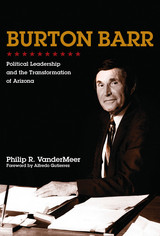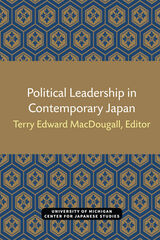
Considered perhaps the most influential person in Arizona’s political development, Burton Barr represented north central Phoenix in the Arizona House of Representatives for the twenty-two years from 1964 to 1986. As the Republican House Majority Leader for twenty of those years, he left his fingerprints on every major piece of legislation during those decades, covering such issues as air pollution, health care for indigents, school aid, the tax code, prison reform, child care, groundwater management, and freeway funding.
Burton Barr’s political life unfolded during the very time his state and region shifted from being outliers to trendsetters. His choices in policy making and his leadership style were both an outcome and a creator of his sociopolitical environment. Arizona politics in the 1960s and ’70s was a rich brew of key elements, a time when the economy was being transformed, the nature and distribution of populations shifted, partisan politics were in flux, and the very lifeblood of the West—water—was being contested under increasing pressures of usage and depletion.
How Barr successfully responded to those challenges is the story of Arizona’s development during those years. At the heart of it, Barr’s political life and personality are inextricably bound up with the life of the West.

This volume examines the array of challenges facing the Obama administration and the president himself. Topics range from how best to manage a ruptured economy to controlling the budget, the green agenda, foreign policy, and the recalibration of U.S. relations with Britain. It also includes sections on presidential leadership, elections, healthcare, and food poverty.
The common theme throughout is the issue of governing in a fractured, unruly political environment, and the accompanying difficulties. Contributing scholars, based at academic institutions in the United States and the UK, offer a range of informed perspectives throughout this engaging work. Packed with detail yet highly accessible, this volume will appeal to those interested in American politics, history, and the political process.

With enormous numbers of new immigrants, America is becoming dramatically more diverse racially, culturally, and ethnically. As a result, the United States faces questions that have profound consequences for its future. What does it mean to be an American? Is a new American identity developing? At the same time, the coherence of national culture has been challenged by the expansion of—and attacks on—individual and group rights, and by political leaders who prefer to finesse rather than engage cultural controversies. Many of the ideals on which the country was founded are under intense, often angry, debate, and the historic tension between individuality and community has never been felt so keenly.
In One America?, distinguished contributors discuss the role of national leadership, especially the presidency, at a time when a fragmented and dysfunctional national identity has become a real possibility. Holding political views that encompass the thoughtful left and right of center, they address fundamental issues such as affirmative action, presidential engagement in questions of race, dual citizenship, interracial relationships, and English as the basic language.
This book is the first examination of the role of national political leaders in maintaining or dissipating America’s national identity. It will be vital reading for political scientists, historians, policymakers, students, and anyone concerned with the future of American politics and society.

This collection of essays draws on writings from mythologists, sociologists, philosophers, historians, and political activists, to present perspectives on the techniques, philosophies, and theories of political leadership throughout history. The forty-three selections offer a broad range of thought and provide a uniquely comprehensive reference.

READERS
Browse our collection.
PUBLISHERS
See BiblioVault's publisher services.
STUDENT SERVICES
Files for college accessibility offices.
UChicago Accessibility Resources
home | accessibility | search | about | contact us
BiblioVault ® 2001 - 2024
The University of Chicago Press









